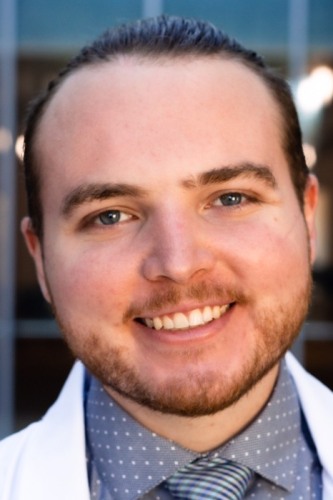
Luke Sullivan '19 MD'23 ScM '23
Biography
Master’s thesis: “Social Needs Analysis of a Transcranial Magnetic Stimulation Patient Cohort”
Residency: University of Connecticut School of Medicine, Emergency Medicine
As an undergraduate in the Program for Liberal Medical Education at Brown, Luke Sullivan learned that “the big puzzle of health care,” as he puts it, “is how are we making sure that folks are connected to the resources they need, and that the 90 percent of health that isn’t happening in clinical spaces is also being addressed in a scientific way.”
He applied to the PC-PM Program to help solve this puzzle. He especially liked the program’s goal to create the “clinician-plus”: “the person who takes great care of the patients in front of them, and also spends their time outside of the clinic trying to better the health of their community,” Luke says.
Much of his LIC experience took place at Newport Hospital, where he was often the only medical student in the building and thus the benefactor of enthusiastic preceptors who wanted to teach him everything from primary care to surgery to infectious diseases. In that community setting, it was easy to follow his patients longitudinally, “from my family medicine clinic to their neurology clinic to cardiology,” Luke says. “There was a lot of independence, which I really appreciated for my learning style.”
But he wasn’t completely on his own: his “incredible” LIC fellows were always available, sharing their knowledge and experience, celebrating his successes, and helping him brainstorm through challenges.
“I really appreciated the help that I got from my LIC fellows,” Luke says, adding that he loves any opportunity to teach and mentor others. Serving as an LIC fellow in his fourth year, he says, was “a good way to give back to the cohort and pass it forward.”
A lifelong Rhode Islander, after graduation Luke will cross the state line to become an emergency medicine resident at UConn. He says he was attracted to the specialty for its role as the “safety net below the safety net below the safety net in our health care system. The folks that you see longitudinally are the folks that may not be able to get care anywhere else.”
As a student, Luke says he met “wonderful clinician-pluses” in the emergency department: physicians who also pursued social medicine or policy projects, or advocated for their patient population. “I think emergency medicine is a good way to have a finger on the pulse of the health of my community and the problems my patients might be facing,” he says.
When he needs to unwind, Luke loves to garden at his family’s home in Pawtucket, and spend “uncle time” with his niece and nephew. He also plays “a lot of Dungeons & Dragons” with friends from his days as an EMT at Brown. “We all went to different med schools, and that is how we stay connected,” he says.